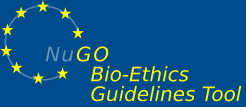- Home
- NuGO Guidelines
-
Definitions
-
Examples
-
Background
-
This is a static version of the NuGO Bioethics Guidelines Tool from 2007. Some links may be outdated. Searching is disabled. Please contact the authors for comments or questions
NuGO Guideline 6
Genotype Information
Disclosure of genotype test results
The extent, form, and timing of the disclosure of genotype test results should be consistent with what was agreed upon in the informed consent (see Guideline 1, see Guideline 2). It should be recognized that disclosure of test results on an individual level is not possible if samples and data are stored unlinked anonymized (see Guideline 1).
Genotype results attained during nutrigenomics research should preferably be communicated (see comment) to the research volunteers on a study group level, and should not be disclosed individually for the following reasons:
- solid evidence linking specific gene polymorphisms to the development of diet-sensitive pathological conditions or responses to dietary interventions is scarce;
- the phenotypic outcome of the kind of genotype data expected to be attained in the context of nutrigenomics research can be modified by many factors, making it very difficult (see comment) their interpretation, in terms of health benefit/risks to the participant, on the individual level
- communication of individual results in large-scale epidemiological research projects would convert the nature of the exercise from a research one into a mass screening undertaking, which might have quite different budgetary and counselling implications [see 54, commentary to ch. 43]
However, if a research volunteer personally insists on receiving his or her personal test results, the information should be given emphasizing possible implications for him or her (see Guideline 7).
Researchers should seek the advice of their ethics committee of reference on the disclosure issue, on a case by case basis, whenever, in the course of nutrigenomics research, genotype information not originally intended to be obtained arises which might be of clinical relevance for the research volunteer or his/her relatives according to the current established knowledge.
(see also Recommendations for the training and qualifications of nutrigenomics specialists...)
Relevant documents
[ 54 ] Draft Report on Collection, Treatment, Storage and Use of Genetic Data
